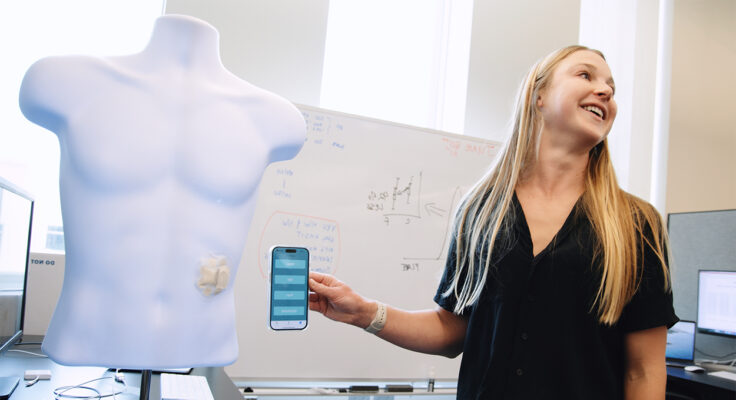In a single moment, the world can change—for a student and teacher, an audience captivated by a performance, or researchers opening a new window into a complex disease. These are Breakthrough Moments, and we’re capturing them in this video series to highlight the visionary work of our grantees in the Arts, Education and Health.
G-Tech Medical, featured in the video below, is one of these visionaries. Their wireless patch system could transform how patients and clinicians alike manage Inflammatory Bowel Disease (IBD) and other gastrointestinal disorders. Our funding was pivotal to helping them refine this promising technology and test it in clinical settings.
A Personal Mission Fuels A Novel Idea
G-Tech Medical’s progress has been steady, catalyzed by early funding and ongoing collaborations with other Kenneth Rainin Foundation grantees. It’s also fueled by a personal mission for CEO Steve Axelrod, PhD. After supporting his daughter, Lindsay, through a frightening onset of Crohn’s disease and the search for an effective treatment, he was inspired to help others.
The only way you get breakthroughs is doing something that’s really new, but if you want something really new, you’re going to have to take chances.
Steve Axelrod, PhD, President and CEO, G-Tech Medical
Dr. Axelrod’s background in developing complex measurement tools led to his breakthrough idea for a system that travels with patients as they experience life and their symptoms. He joined Dr. Anand Navalgund, a biomedical engineer and now G-Tech Medical’s Director of Clinical Science, whose postdoc work focused on measuring electrical currents from skeletal muscles using similar techniques.
Designing For Patients First
Dubbed an “EKG for the gut,” the resulting noninvasive device is a wearable, wireless patch. Lindsay Axelrod was one of their first test subjects, when 30 electrodes on her belly registered the first stomach signal. She eventually earned a Master’s in Translational Medicine (MTM) and is now Staff Research Associate at the company. As her technical expertise has grown, she has expanded G-Tech Medical’s capacity to finesse the device’s development. Lindsay’s lived experience with the disease is central to their patients-first focus. Her perspective on the day-to-day experience of patients informs their research questions, product design and clinical trial protocols.
It’s one thing to think you know how patients respond or what they want. But it’s another to be in that world. I want this to be successful for people like me.
Lindsay Axelrod, MTM, Senior Research Associate, G-Tech Medical
G-Tech Medical’s aim is to improve patient care and therapeutic outcomes, while reducing costs. The patch is designed to continuously track and measure gastrointestinal motility over several days. The team’s goal is to create a product that helps doctors and patients understand unique gut signals and locate the underlying problem. With more timely and accessible information, patients and clinicians can also be proactive and adjust medications to avoid potential flares.
Partnering To Expand Their Impact
The Rainin Foundation’s Health Program encourages collaboration in grantee projects. G-Tech Medical’s emphasis on internal collaboration has improved the success of their device. It has also set the stage for fruitful collaborations with external partners and expanding the range of applications for their technology.
In addition to IBD, the device holds promise for diagnosing other gastrointestinal disorders and evaluating the effectiveness of various therapies. G-Tech Medical’s partners at Yale University recently presented findings from a study of patients following abdominal surgery. A multi-day study with Stanford University compared their device’s external measurements with internal electrode recordings in pigs. And another study at Mayo Clinic in Florida compared the “EKG for the gut” to the gastric emptying scintigraphy test, the gold standard for diagnosing gastroparesis.
G-Tech Medical continues to collaborate with research institutions across the country on additional studies and patient trials. They include the Cleveland Clinic, University of South Florida, University of Michigan, Temple University and Harvard University. Each one allows G-Tech Medical to test new applications and infuse additional funding to advance their device’s development.
Opening The Door To Crucial Connections
The Rainin Foundation’s investment in G-Tech Medical opened the door to connections that were key to the company’s progress. Our early support also gave them the confidence and credibility boost they needed at a critical time. Their success is a testament to their patient-focused mission and pursuit of a pioneering idea.
Innovation is the cornerstone of what G-Tech Medical does well and what we want to champion.
Laura Wilson, PhD, Director, Health Strategy & Ventures
The Foundation invests in novel, high-risk ideas to accelerate IBD research. Our early support enables innovators to test ideas and gather data to attract additional funding and seed key breakthroughs. We celebrate our grantees’ advances and encourage other researchers to explore our funding opportunities.

